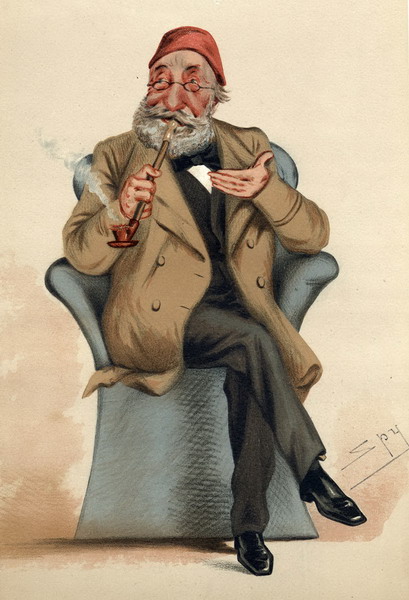|
I have a wonderful image of his statue close to Sultan Ahmet.
He was the son of a civil judge, was born at Der Saadet in 1822. His father, a declared partisan of reform, trained him for an administrative career, and at the age of twenty-two he was attached as secretary to Faik Effendi, whom he accompanied in Syria for three years.
On his return to Constantinople, Midhat was appointed chief director of confidential reports, and after a new financial mission in Syria was made second secretary of the grand council. His enemies, however, succeeded in ousting him from this post, and caused him to be entrusted with the apparently impossible task of settling the revolt and brigandage rampant in Rumelia.
His measures were drastic and their success was startling and the government made him an official of the first rank and restored him to his place in the grand council. In similar vigorous fashion he restored order in Bulgaria in 1857. In 1860 he was made vizier and pasha, and entrusted with the government of Nis, where his reforms were so beneficial that the sultan charged him, in conjunction with Fuad Pasha and Ali Pasha, to prepare the scheme for adapting them to the empire which was afterwards known as the law of the vilayets.
After further administrative work in his province, he was ordered to organize the council of state in 1866, and was then made governor of Baghdad, where his success was as decisive as at Nis, but attended with much greater difficulties. In 1871, the anti-reform influence of the grand vizier, Mahmoud Nedim, seemed to Midhat a danger to the country, and in a personal interview he boldly stated his views to the sultan, who was so struck with their force and entire disinterestedness that he appointed Midhat grand vizier in place of Mahmoud. However, proving himself too independent for the court, Midhat remained in power only three months, and after a short governorship of Salonic he lived apart from affairs at Constantinople until 1875.
From this time forward, however, Midhat Pashas career resolved itself into a series of strange and almost romantic adventures. While sympathizing with the ideas and aims of the Young Ottomans, he was anxious to restrain its impatience, but the sultans obduracy led to a coalition between the grand vizier, the war minister and Midhat Pasha, which deposed him in May 1876, and he was murdered in the following month.
His nephew Murad V was in turn deposed in the following August and replaced by his brother, Abdul Hamid II. Midhat Pasha now became grand vizier, reforms were freely promised, and the Ottoman parliament was inaugurated with a great flourish. In the following February, however, Midhat was dismissed and banished for supposed complicity in the murder of Abdul Aziz. He then visited various European capitals, and remained for some time in London, where he carefully studied the procedure in the House of Commons.
Again recalled in 1878, he was appointed governor of Syria, and in August exchanged offices with the governor of Smyrna. But in the following May the sultan again ordered him to be arrested, and although he effected his escape and appealed to the powers, he shortly afterwards saw fit to surrender, claiming a fair hearing. The trial was made in the garden of the sultan Abdu’l-Hamid II in the Yildiz Palace and took place in three days in June 1881, Midhat and the others were sentenced to death. It was, however, generally regarded as a mockery, and on the intercession of the British government the sentence was commuted to banishment.
The remaining three years of his life were consequently spent in exile at Taif in Arabia, where he died, probably by violence, on 8 May 1884. To great ability, wide sympathies, and undoubted patriotism he added absolute honesty, that rare quality in a vizier, for he left office as poor as when he entered it.
Mithat Pasha on the cover of Vanity Fair, June 30, 1877.Ahmed Midhat Pasha (October 1822, Istanbul – 8 May 1883, At-Ta'if, Arabia) was a dynamic, pro-Western, enlightened Turkish reformer and statesman.

|

